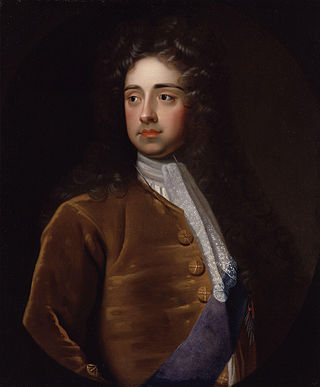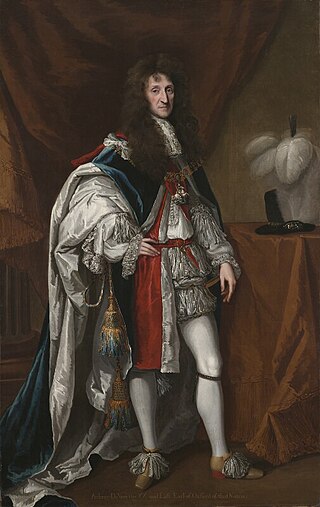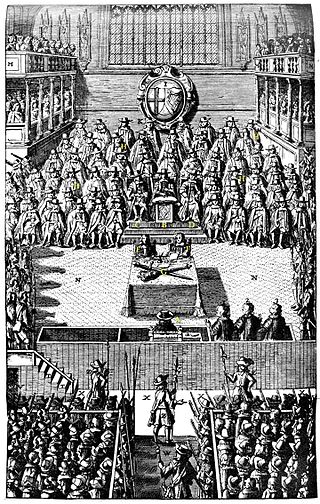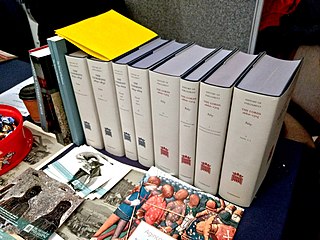Related Research Articles

Edward Hyde, 1st Earl of Clarendon was an English statesman, lawyer, diplomat and historian who served as chief advisor to Charles I during the First English Civil War, and Lord Chancellor to Charles II from 1660 to 1667.

Thomas Howard, 5th Duke of Norfolk was an English nobleman who from 1645 was deemed a lunatic. Born the eldest son of Henry Howard, 15th Earl of Arundel, Howard left England to study at Utrecht University at the start of the English Civil War. While visiting his paternal grandfather at Padua in 1645 he contracted a fever that damaged his brain. He was declared insane and confined in Padua with a physician caring for his needs. He became Earl of Arundel upon the death of his father in 1652.

Charles Talbot, 1st Duke of Shrewsbury was an English peer and Whig politician who was part of the Immortal Seven group that invited William of Orange to depose King James II of England during the Glorious Revolution. He was appointed to several minor roles before the revolution, but came to prominence as a member of William's government. Born to Roman Catholic parents, he remained in that faith until 1679 when—during the time of the Popish Plot and following the advice of the divine John Tillotson—he converted to the Church of England. Shrewsbury took his seat in the House of Lords in 1680 and three years later was appointed Gentleman-Extraordinary of the Bedchamber, suggesting he was in favour at the court of Charles II.

Conrad Sebastian Robert Russell, 5th Earl Russell,, was a British historian and politician. His parents were the philosopher and mathematician Bertrand Russell and his third wife Patricia Russell. He was also a great-grandson of the 19th-century British Whig Prime Minister Lord John Russell. He succeeded to the earldom on the death of his half-brother, John Russell, on 16 December 1987. Both sons were named after their father's great friend Joseph Conrad, who was also the 4th Earl's godfather.

The Commander-in-Chief of the Forces, later Commander-in-Chief, British Army, or just the Commander-in-Chief (C-in-C), was (intermittently) the professional head of the English Army from 1660 to 1707 and of the British Army from 1707 until 1904. In 1904 the office was replaced with the creation of the Army Council and the appointment of Chief of the General Staff.

Colonel Adrian Scrope was a Parliamentarian soldier during the Wars of the Three Kingdoms, and one of those who signed the death warrant for Charles I in January 1649. Despite being promised immunity after the Restoration in 1660, he was condemned as a regicide and executed in October.

Sir Isaac Penington was an English politician who sat in the House of Commons from 1640 to 1653. He was Lord Mayor of London in 1642 and a prominent member of Oliver Cromwell's government.

Aubrey de Vere, 20th Earl of Oxford, KG, PC was an English peer and military officer who fought on the Royalist side during the English Civil War.
Sir John Ernle was an English politician who sat in the House of Commons at various times between 1654 and 1695. He was one of the longest-serving Chancellors of the Exchequer, a position he held from 2 May 1676 to 9 April 1689.

In 1649, the Rump Parliament established an ad hoc High Court of Justice for the trial of Charles I, King of England, Scotland and Ireland.
John Simon Fowler is an English social historian and author who lives in Kew, Richmond, London and is vice-chair of the Richmond Local History Society. He has written many books relating to family history and social history.

Admiral Sir John Jennings was a Royal Navy officer and Whig politician who sat in the English and British House of Commons between 1705 and 1734. He commanded HMS Kent at Cadiz and Vigo in 1702 during the War of the Spanish Succession. He went on to be Commander-in-Chief of the Jamaica Station, then Senior Naval Lord and finally Governor of Greenwich Hospital.

Sir Robert Atkyns, was a topographer, antiquary and Member of Parliament. He is best known for his county history, The Ancient and Present State of Glostershire, published in 1712.

Sir William Godolphin was an English diplomat for Charles II and Member of Parliament.

The History of Parliament is a project to write a complete history of the United Kingdom Parliament and its predecessors, the Parliament of Great Britain and the Parliament of England. The history will principally consist of a prosopography, in which the history of an institution is told through the individual biographies of its members. After various amateur efforts the project was formally launched in 1940 and since 1951 has been funded by the Treasury. As of 2019, the volumes covering the House of Commons for the periods 1386–1421, 1509–1629, and 1660–1832 have been completed and published ; and the first five volumes covering the House of Lords from 1660 to 1715 have been published, with further work on the Commons and the Lords ongoing. In 2011 the completed sections were republished on the internet.

The Loyal Parliament was the only Parliament of England of King James II, in theory continuing from May 1685 to July 1687, but in practice sitting during 1685 only. It gained its name because at the outset most of its members were loyal to the new king. The Whigs, who had previously resisted James's inheriting the throne, were outnumbered both in the Commons and in the Lords.
Arthur Moore M.P., of Fetcham Park, Surrey, was an Irish businessman, economist and Tory politician who sat in the English and British House of Commons between 1695 and 1722.
This article is about the particular significance of the year 1731 to Wales and its people.
Paul Seaward is a British historian specialising in seventeenth-century English history.
References
- ↑ Biography
- ↑ History of Parliament Staff - Biography
- ↑ Knights, Mark (15 April 2019). "The History of Parliament: The House of Lords, 1660–1715, ed. Ruth Paley". The English Historical Review. 134 (566): 221–224. doi:10.1093/ehr/cey368. ISSN 0013-8266.